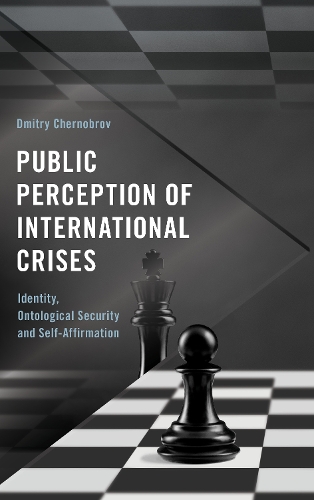
Public Perception of International Crises: Identity, Ontological Security and Self-Affirmation
(Hardback)
Publishing Details
Public Perception of International Crises: Identity, Ontological Security and Self-Affirmation
By (Author) Dmitry Chernobrov
Bloomsbury Publishing PLC
Rowman & Littlefield International
24th June 2019
United Kingdom
Classifications
Professional and Scholarly
Non Fiction
Civics and citizenship
Warfare and defence
327.101
Winner of Furniss Book Award 2019
Physical Properties
Hardback
256
Width 160mm, Height 228mm, Spine 24mm
567g
Description
How do people make sense of distant but disturbing international events Why are some representations more appealing than others What do they mean for the perceivers own sense of self Going beyond conventional analysis of political perception and imagining at the level of accuracy, this book reveals how self-conceptions are unconsciously, but centrally present in our judgments and representations of international crises. Combining international relations and psychosocial studies, Dmitry Chernobrov shows how the imagining of international politics is shaped by the need for positive and continuous societal self-concepts. The book captures evidence of self-affirming political imagining in how the general public in the West and in Russia understood the Arab uprisings (also known as the Arab Spring) and makes an argument both about and beyond this particular case. The book will appeal to those interested in international crises, political psychology, media and audiences, perception and political imagining, ontological security, identity and emotion, and collective memory.
Reviews
This book highlights essential factors in political world events which are usually not touched upon by the media. The role of personal and collective identities, the reactivation of shared images of past historical events, and anxiety of the unknown are described and clearly illustrated. For those wishing to make sense of today's international political climate, I highly recommend reading this timely book. -- Vamik Volkan, Professor Emeritus of Psychiatry, University of Virginia
Developing an innovative theoretical framework emphasising the role of (mis)recognition as a means of coping with uncertainty and emergent anxieties, Chernobrov provides a timely and important intervention that fundamentally rethinks the role of perception in public understandings of international crises. For anyone interested in the politics of perception, recognition, emotion and emerging debates about ontological security within international relations, this is a must read. -- Christopher Browning, Reader of Politics and International Studies, University of Warwick
This refreshing and original book persuasively demonstrates that popular understanding of foreign affairs, especially at times of crises, is fundamentally shaped by the publics own sense of identity, security, and political memory. Exploring Russian and UK perceptions of the Arab Spring, Chernobrov provides excellent evidence that public attitudes of international politics are based primarily on local anxieties, fears, and hopes. -- Jelena Subotic, Professor of Political Science, Georgia State University
In this eloquent interweaving of insights from ontological security theory, social psychology, international relations, media and audience studies, Chernobrov offers an empirically grounded and theoretically sophisticated exploration of the intricate relationships between identity, emotion and the perceptions of international others. The distant is domesticated as the societal need for positive self-affirmation shapes the public perception of international events. -- Maria Mlksoo, Senior Lecturer in International Security, University of Kent
This important book tackles significant dimensions of political imaginings and how these are shaped by insecurities, anxieties and histories of identities. While there are many accounts with the ambition to explain public perceptions of international crises, this book offers a very timely and novel approach to conceptions of crises as understood through the logics of ontological security and positive self-affirmation. -- Catarina Kinnvall, Professor of Politics, Lund University
Author Bio
Dmitry Chernobrov is Lecturer in Media and International Politics at the University of Sheffield, UK.
